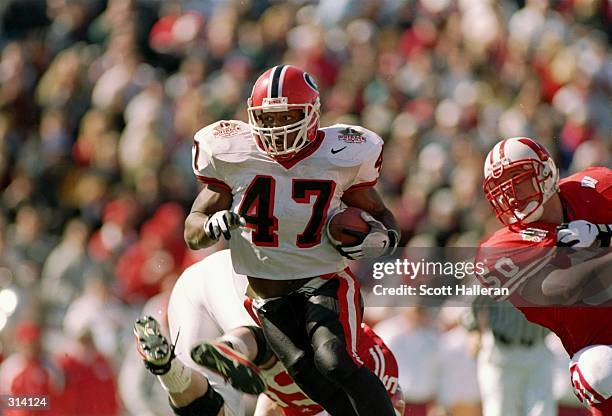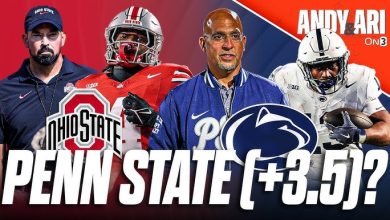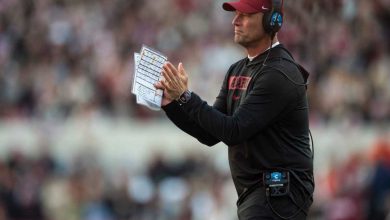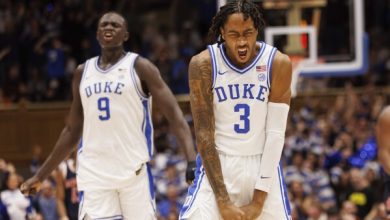Robert Edwards conducts the Redcoat Band following Georgia’s 33-6 win over Wisconsin in the 1998 Outback Bowl.

In the grand tapestry of college football history, certain moments stand out not just for the score on the scoreboard, but for the emotional resonance they carry. One such moment came on January 1, 1998, at Tampa Stadium in Florida. Georgia had just defeated Wisconsin 33-6 in the Outback Bowl, and as the clock struck zero, it wasn’t just the scoreboard that commanded attention—it was Robert Edwards, the senior running back, stepping onto the podium to conduct the Redcoat Band.
In that single moment, surrounded by his teammates, fans, and a sea of red and black, Edwards took up the baton and led the Georgia fight song with the confidence and pride of a warrior who had just helped his team secure a dominant postseason win. It was more than a celebration—it was a symbolic gesture that captured the heart, soul, and spirit of Georgia football in the late 1990s.
A Comeback Player’s Redemption Arc
Robert Edwards’ journey to that moment was anything but easy. Born in Tennille, Georgia, Edwards began his career at the University of Georgia as a cornerback before switching to running back—a move that would prove pivotal in both his college career and his path to the NFL. His talent was undeniable. He had a rare blend of speed, power, and field vision that made him a force to be reckoned with in the SEC.
But Edwards’ rise was interrupted by a devastating foot injury in 1996. The injury sidelined him for nearly an entire season and cast doubt on whether he would ever return to his previous form. For many players, that kind of setback could have derailed a career entirely. For Edwards, it became fuel for one of the most inspiring comeback stories in Georgia football history.
By the 1997 season, Edwards was back—and better than ever. His performances throughout the season reminded fans of his early dominance and reassured scouts that he still had the chops for the next level. The 1998 Outback Bowl, then, was more than just another game. It was a culmination of years of effort, grit, and determination.
The 1998 Outback Bowl: Georgia vs. Wisconsin
Georgia entered the 1998 Outback Bowl with a 9-2 record, led by head coach Jim Donnan, and fielded a balanced team on both sides of the ball. Wisconsin, coming in at 8-4 under coach Barry Alvarez, was known for their hard-nosed defense and powerful running game. On paper, the two teams appeared to be closely matched, but Georgia’s performance told a different story.
The Bulldogs dominated from start to finish. Georgia’s offense clicked early, and their defense stifled the Badgers at nearly every turn. Robert Edwards led the charge, scoring three touchdowns and racking up 112 yards on the ground. His explosive runs and ability to find seams in the Wisconsin defense earned him the game’s MVP honors.
The final score—33-6—reflected not only Georgia’s dominance but also Edwards’ central role in the victory. His three-touchdown performance served as a fitting exclamation point on a college career marked by resilience and excellence.
Conducting the Redcoat Band: Symbolism and Celebration
As the team celebrated on the field, fans in the stands erupted in cheers. But the true climax came after the handshakes and the trophy presentation. Climbing up onto the bandstand near the corner of the end zone, Edwards took hold of the conductor’s baton and faced the Redcoat Marching Band.
It’s a long-standing tradition at Georgia for players—especially seniors or stars of the game—to take a turn leading the band after a big win. But for Robert Edwards, this wasn’t just a routine celebration—it was a deeply personal moment. There he stood, after years of highs and lows, leading 400 musicians and 30,000 fans in a raucous rendition of “Glory, Glory to Old Georgia.”
Photos and video clips from that moment show Edwards beaming with pride, his arm confidently swiping through the air, leading the beat as the Redcoats played Georgia’s alma mater and fight songs. For teammates, it was a moment of unity and joy; for fans, it was a visual embodiment of triumph and redemption.
Impact on the Georgia Program
The 1998 Outback Bowl win, punctuated by Edwards’ leadership, marked a turning point for Georgia football. Though national championship contention was still a few years away, this victory helped solidify the Bulldogs as a program on the rise. It was also one of the most satisfying wins under Coach Jim Donnan, who had begun reshaping the team into a formidable SEC contender.
Robert Edwards’ heroics helped propel Georgia into the national conversation, and his personal story served as motivation for future Bulldogs. He showed that setbacks didn’t have to define a player—that with hard work, patience, and belief, any obstacle could be overcome.
From Bowl Glory to the NFL
Just months after conducting the Redcoat Band, Edwards would be drafted in the first round of the 1998 NFL Draft by the New England Patriots. In his rookie season, he made an immediate impact, rushing for over 1,100 yards and scoring 12 touchdowns. He became only the second Patriots rookie in history to break the 1,000-yard mark, and his early success suggested a long and productive professional career.
However, tragedy struck again when Edwards suffered a catastrophic knee injury during a beach football game at the 1999 Pro Bowl in Hawaii. The injury nearly cost him his leg and sidelined him for three seasons. Doctors feared he would never walk again, let alone play football. But, in classic Edwards fashion, he fought his way back and made a brief but miraculous return to the NFL in 2002 with the Miami Dolphins.
While he never regained his rookie form, his resilience in coming back from two potentially career-ending injuries earned him the respect of players and fans alike. To this day, he remains a symbol of perseverance in the face of adversity.
The Redcoat Band: A Unique Georgia Tradition
The Redcoat Marching Band, a staple of Georgia’s game-day culture, has long played a pivotal role in creating the electric atmosphere that surrounds Bulldogs football. Founded in 1905, the band has grown into one of the most recognized collegiate marching bands in the country.
Allowing players to conduct the band after key wins has become a cherished tradition—one that signifies respect, gratitude, and celebration. It’s a way for players to connect with the fans and the spirit of the university. When Robert Edwards stepped onto the podium that day in Tampa, he wasn’t just celebrating a win—he was participating in a piece of Georgia heritage.
Remembering the Moment Today
More than two decades later, Georgia fans still talk about that moment in the 1998 Outback Bowl—the game, the win, and especially Robert Edwards’ triumphant stand before the Redcoat Band. In online forums, documentaries, and alumni gatherings, the memory is often recalled with a mix of nostalgia and admiration.
Many younger fans, who weren’t yet born in 1998, have seen the moment replayed during halftime tributes or social media highlights. It’s become a teaching point for new generations of Bulldogs: the importance of heart, leadership, and what it means to represent the “G” on and off the field.
A Lasting Legacy
Robert Edwards’ story is one of the most powerful in the annals of Georgia football. From high school standout to college star, from devastating injuries to unforgettable comebacks, his life is a study in resilience. His moment with the Redcoat Band wasn’t just the celebration of a game—it was the punctuation mark on a chapter that had already inspired so many.
Today, Edwards remains involved in football and mentoring. After retiring from the NFL, he coached high school and college athletes, including a stint as the head coach of the Kentucky Christian University football team. His passion for the game, combined with his life experiences, make him a beloved figure in Georgia’s football family.









